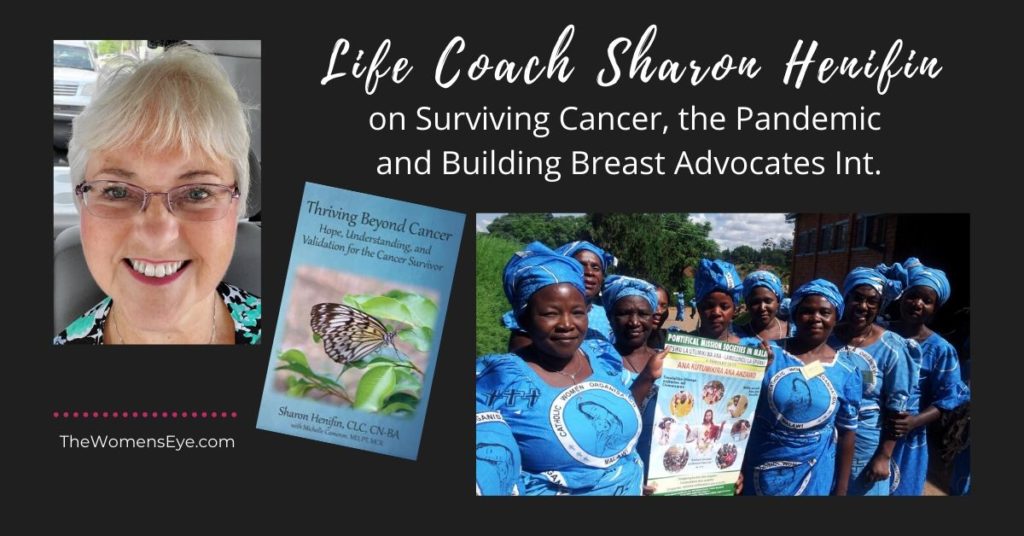
During this pandemic, we find that a lot of our readers like Sharon Henifin, co-founder of Breast Advocates International, have had their plans suddenly disrupted.
Sharon emailed us that her upcoming trip to Malawi to teach women about vital self-breast exams had been postponed due to the virus. She wanted to share her experience and knowledge about the essential medical needs of women there and in many foreign countries.
I absolutely believe that our work with Breast Advocates International saves lives. Places like Malawi have 100% mortality from breast cancer. They have no access to early detection methods.
We felt Sharon’s mission was important and wanted to learn more about her journey to save the lives of women in underserved countries and just how BAI came to be.
During our interview this life coach shared some advice on dealing with adversity, including the uncertainty of pandemics…
EYE: When did Breast Advocates International start and how disappointed are you that your trip to Malawi will have to wait?
SHARON: About a year ago, an RN friend Melissa Nye asked me to get involved with a project she’d been doing for several years. I agreed and helped her create the framework for the nonprofit Breast Advocates International.
This year Melissa and I planned our trip to coincide with the second ever breast cancer conference in the capital city of Lilongwe Malawi. Our plan was to meet many of the other breast cancer players in Africa then head to the rural areas and fulfill our mission.
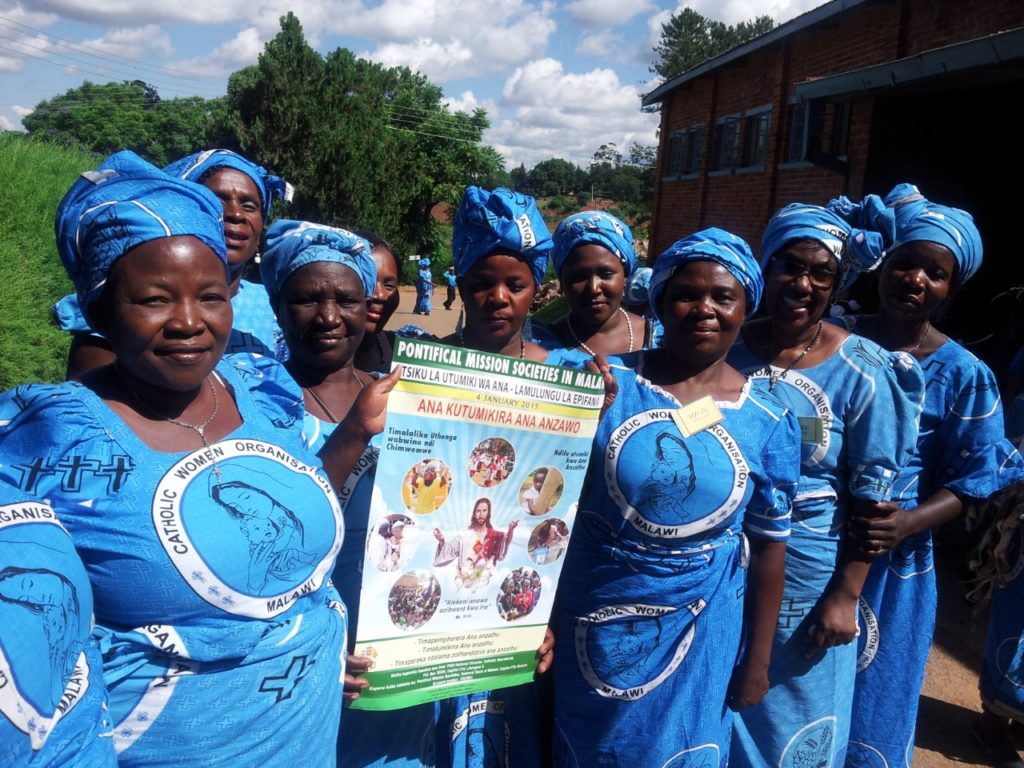
I was very disappointed when we first talked about canceling our trip. After a few days we decided the worst thing we could imagine would be to be a carrier of the virus and accidentally take it to Malawi.
They don’t have the healthcare resources for a terrible pandemic like we are experiencing in the U.S.
EYE: What will happen to those women now that you may not get there for awhile?
SHARON: Our work is lifesaving, but luckily Melissa has been to Malawi twice before. She has trained 65 navigators who already work with the village women.
Our sustainable plan includes three trips to underserved countries to cement the training of clinical and self-breast exams. The navigators are trained to find suspicious lumps then break down the barriers to get the healthcare the ladies need.
Most villages are six to eight miles away from medical help, but without transportation walking those miles can be challenging. If we can reschedule our next trip for October, we will train the trainers so local women can continue this program even when our organization has moved on to the next country that needs our help.
We will also connect to the local hospitals and clinics, train them on our process and find new surgeons to help give the women the care they so desperately need.
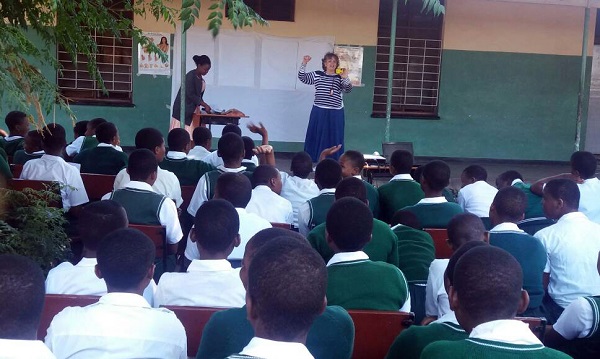
EYE: You have long been an advocate for breast cancer survivors and are yourself a survivor. What made you become so involved with the issue and the women cancer is affecting?
SHARON: When I was diagnosed 26 years ago, I remember feeling so scared and isolated. I remember my doctor asking me early on after completing my physical recovery to talk to some of his patients. I would meet with each woman at a coffee shop; we talked all about how the surgeries are necessary to cure cancer.
These experiences helped me too. I was able to process some of the emotions I had stuffed and I could tell I was making a difference for each one of these ladies. Later several of my friends were diagnosed. I was able to help them too since I was the first in our circle to go through treatment.
EYE: Did you feel like you had a new purpose?
SHARON: Yes, and since my job didn’t seem to give me the joy it once did, I was thankful for a new direction. After a few more years, my friend Becky had a scare. I accompanied her to her doctor to make sure she didn’t go alone.
Over lunch we decided we needed to do something more to help other women going through breast cancer. We decided that the emotional support of patients and family and friends was lacking in the world of breast cancer.
At that lunch we decided to start Breast Friends, whose mission is to help women with the emotional trauma of breast cancer, one friend at a time. Through the last 20 years we have created and facilitated programs for the patient, her family and friends to make sure they had the emotional, physical, social support she needs through treatment and many years later.
EYE: It seems that it was important for you to have partners in forming your nonprofits?
SHARON: Becky and I worked for 6 years full-time in our corporate America jobs while we were establishing and helping women and their families at Breast Friends in our spare time. I made the decision to retire at the end of 2019 from Breast Friends which is the same year I helped start Breast Advocates International.
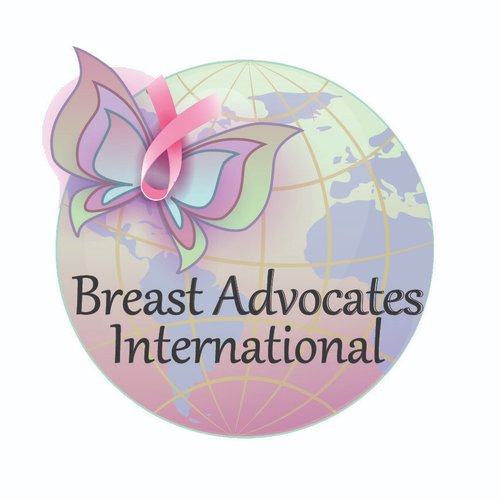
I doubt I could have successfully executed Breast Friends without Becky, so when Melissa asked for my help with BAI, I knew this partnership would have its ups and downs, but better together with someone special. Melissa and I have different skill sets and they complement each other as we grow Breast Advocates International.
EYE: Does your organization save lives? That’s a great responsibility.
SHARON: I absolutely believe our work with Breast Advocates International save lives. Places like Malawi have 100% mortality from breast cancer. They have no access to early detection methods. They don’t have mammography or ultrasound machines because they don’t have stable electricity.
Additionally there is a stigma surrounding cancer. People are frightened of cancer and actually think that saying the word can produce the disease. That is why this grassroots approach of teaching women about it and about how if they find a lump early enough, they do not have to die from this disease.
We also train teens to help us reach the moms and grandmas of the village as well as change the dynamics for future generations. So yes, this is a huge responsibility.
It’s important work to help the women of underserved countries know they don’t have to die from a disease like cancer and give them the tools they need to make it possible.
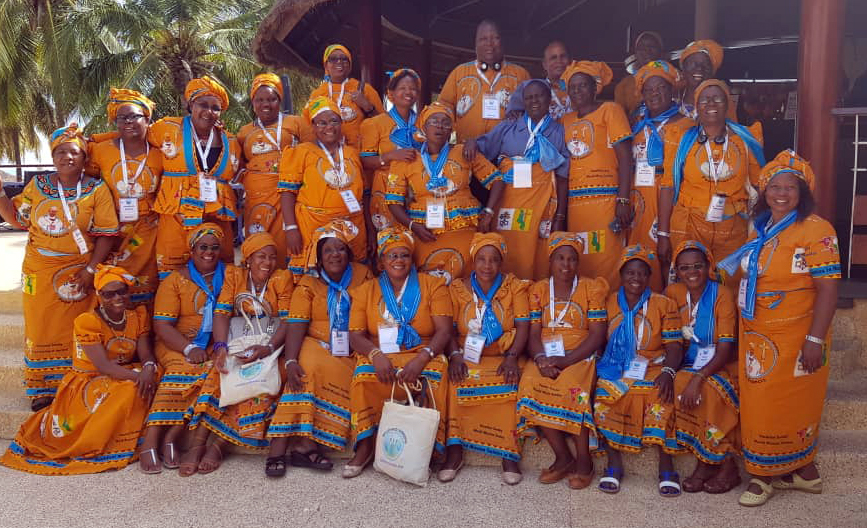
EYE: How do you keep going? Malawi is a continent away. Why Malawi and do you want to spread your mission to other countries?
SHARON: Malawi is only one of the many places we plan to help. Melissa had already helped women in Haiti and Palestine before I got involved. We have almost a dozen invitations from other countries that want our program now.
We are committed to travel to each country we assist three separate times. This way the local women can carry it on with minimal input from us. Our strategic plan is to train a couple more teams like Melissa and myself.
Our plan is to also extend the invitation to survivors, women who want a firsthand experience as volunteers. Our hope is that they become ambassadors and advocates here in the states to get the financial support we need to get the message out.
There was a time when women didn’t find their cancer before it had spread throughout their bodies. I believe women around the world deserve a better outcome and with Breast Advocates International I hope to offer it to them.

EYE: You recently did a poignant blog titled I’ve Been Here Before. Your husband said he hadn’t been through anything like this coronavirus craziness before. You said, yes, you had. Explain.
SHARON: I see so many parallels between what we are experiencing now with coronavirus and what I and others have endured during cancer treatment especially chemotherapy.
Being told you have cancer is one of the scariest things a woman can go through, but being told by the media that if I don’t do certain things I will get coronavirus is just as frightening especially when you’re 60 or older.
When going through cancer, the uncertainty of life brings up questions like will the treatment work; will the cancer come back; and how is it going to affect my future. Just like this virus, it affects everything in life.
It can ruin us financially, or stop us from doing things we love or making plans for the future. I have been here before, but just like the first time where I felt isolated and alone, I got through it and so will everyone else if they concentrate on what they have control over and not all the uncertainty.
EYE: You say, make this a time to shine, even if you have experienced chemotherapy or something as life changing. How do people do that?
SHARON: It’s a choice. Life is uncertain. No one has an expiration date stamped on the bottom of our foot, so whether its cancer or this crazy virus it’s important to find the joy in life.
Sometimes we have to change our expectations around a topic, but when we look hard enough we can find the positive in every situation. If I focus on cancer, even this pandemic or all the things I’m missing out on – the trip I had to cancel, the people I can’t hang out with – it will make me sad, mad even.
But if I look for the blessings, be grateful for what I have, not what I don’t have or have lost. Don’t get me wrong, it takes work to look for the positive when the negative is all around you. But if you make a conscious choice to look for and appreciate the good in life, you will get through this and you might even enjoy it.
EYE: You are a life coach as well as an advocate. How do you keep people moving forward in a positive way?
SHARON: I ask the hard questions to get to the heart of what my clients want for their future. Sometimes it’s hard to know what we do want but we know what we don’t want, and we go from there.
It’s a time of discovery, allowing ourselves to try new things and repackaging ourselves. I look at myself as a cheerleader, that person in your life you can be completely honest with that doesn’t judge you.
I remind my ladies what is important to them. I use some of my coping strategies like focusing on the positive, gratitude while building their confidence, self worth along with setting realistic goals for things that matter.
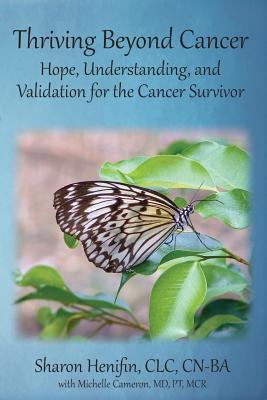
EYE: You wrote Thriving Beyond Cancer: Hope, Understanding and Validation of the Cancer Journey. What was your goal with the book?
SHARON: Before I wrote this book, I never saw myself as a writer. But the funny thing was that I needed to write this book. I was the expert on this topic. No one was as qualified to write this book as I was.
Breast Friends primarily served women from the Portland Metro area, but that didn’t seem like enough. Women all over the U.S. and the world go through breast cancer and experience many of the same emotions as those who came to the Thriving Beyond Cancer workshop or retreat. What about them?
So after several years, I was able to offer the world my workshop of sorts in a book that validates women’s experiences and feelings and give them the tools they need to move on to be their best selves.
EYE: What kind of support do you need?
SHARON: Support comes in many ways. At Breast Advocates International we need all kinds of support. To honor our commitments and expand the work we feel is important we need financial and emotional support. We need advocates like myself who are passionate in helping other women in faraway places.
EYE: Thank you so much for talking with us, Sharon. Wishing you great success spreading BAI around the world!
For more about Sharon Henifin and how you can help, check out:
- Website: breastadvocatesinternational.org
- Facebook: sharon.henifin
- Twitter: @sharonhenifin
- Instagram: @sharonhenifin
If you liked this post, you might be interested in:



Leave a Reply